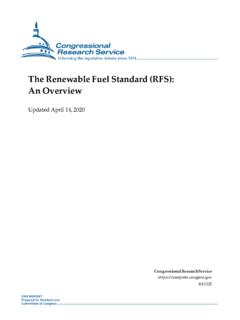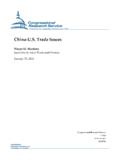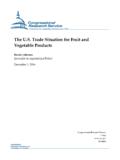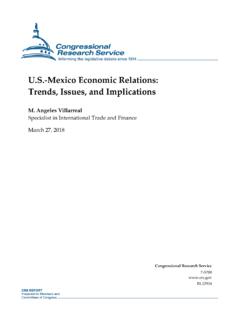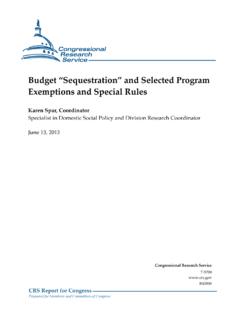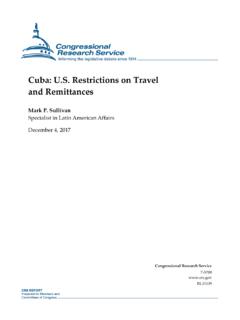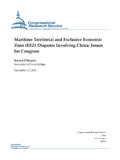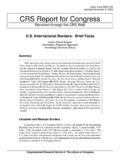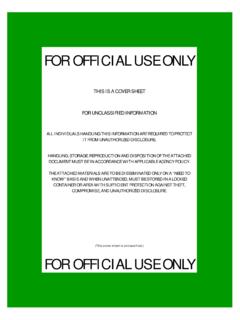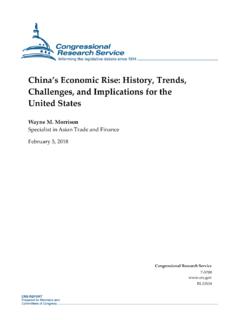Transcription of Venezuela: Overview of U.S. Sanctions
1 Updated October 30, 2020 Venezuela: Overview of SanctionsFor more than a decade, the United States has imposed Sanctions in response to activities of the Venezuelan government and Venezuelan individuals. In response to the authoritarian leadership of Nicol s Maduro, the Trump Administration has significantly expanded Sanctions . As of October 30, 2020, the Treasury Department has imposed Sanctions on roughly 159 Venezuelan or Venezuelan-connected individuals, and the State Department has revoked the visas of more than 1,000 individuals and their families. The Trump Administration also has imposed Sanctions on Venezuela s state oil company (Petr leos de Venezuela, , or PdVSA), government, and central bank. Sanctions have increased economic pressure on the Maduro government, accelerating a decline in oil production. Nevertheless, Maduro remains in power almost two years since the United States ceased to recognize his presidency.
2 The Trump Administration has promised continued support to National Assembly President Juan Guaid , whom the United States and 57 governments recognize as interim president of Venezuela. In 2020, Treasury has sanctioned two subsidiaries of the Russian state-controlled Rosneft Oil Company for facilitating Venezuelan oil exports and four shipping companies for transporting Venezuelan oil. Terrorism-Related Sanctions Since 2006, the Secretary of State has made an annual determination that Venezuela is not cooperating fully with United States anti-terrorism efforts pursuant to Section 40A of the Arms Export Control Act (22 2781). The most recent determination was made in May 2020. As a result, the United States has prohibited all commercial arms sales and retransfers to Venezuela since 2006. In 2008, Treasury imposed financial Sanctions on two individuals and two travel agencies in Venezuela for financially supporting the radical Lebanon-based Islamic Shiite group Hezbollah.
3 Pursuant to Executive Order ( ) 13224, those Sanctions relate to terrorist funding. Drug Trafficking-Related Sanctions Since 2005, pursuant to procedures in the Foreign Relations Authorization Act, FY2003 ( 107-228, 706; 22 2291j), the President has made an annual determination that Venezuela has failed demonstrably to adhere to its obligations under international narcotics agreements. President Trump made the most recent determination for FY2020 in August 2019 but waived foreign aid restrictions for programs that support the interim government. Treasury has imposed economic Sanctions on at least 22 individuals with connections to Venezuela and 27 companies by designating them as Specially Designated Narcotics Traffickers pursuant to the Foreign Narcotics Kingpin Designation Act ( 106-120, Title VIII; 21 1901 et seq.). Designated individuals include current and former Venezuelan officials, such as then-Vice President Tareck el Aissami and Pedro Luis Martin (a former senior intelligence official) and two associates.
4 Targeted Sanctions Related to Antidemocratic Actions, Human Rights Violations, and Corruption In response to increasing repression in Venezuela, Congress enacted the Venezuela Defense of Human Rights and Civil Society Act of 2014 ( 113-278; 50 1701 note) in 2014. Among its provisions, the law requires the President to impose Sanctions (asset blocking and visa restrictions) against those whom the President identifies as responsible for significant acts of violence or serious human rights abuses or anyone who has ordered the arrest or prosecution of a person because of the person s legitimate exercise of freedom of expression or assembly. Congress extended this act through 2019 in 114-194. In December 2019, Congress extended this act through 2023 in 116-94. In March 2015, President Obama issued 13692 to implement 113-278, and Treasury issued regulations in July 2015 (31 Part 591).
5 The targets (for asset blocking and visa restrictions) those involved in actions or policies undermining democratic processes or institutions; serious human rights abuses; prohibiting, limiting, or penalizing freedom of expression or peaceful assembly; and public corruption. It includes any person who is a current or former leader of any entity engaged in any of those activities, as well as current or former government officials. As of October 30, 2020, Treasury has imposed financial Sanctions on 109 Venezuelans pursuant to 13692. Under the Obama Administration, Treasury froze the assets of seven Venezuelan officials responsible for repressing protestors. During the Trump Administration, Treasury has imposed Sanctions on an additional 102 Venezuelan officials, including President Maduro; his wife, Cecilia Flores, and son, Nicol s Maduro Guerra.
6 Executive Vice President Delcy Rodriguez; Diosdado Cabello (Socialist party president); eight supreme court judges; the leaders of Venezuela s army, national guard, and national police; governors; the director of the central bank; and the foreign minister also are sanctioned. In May 2019, Treasury lifted Sanctions against the former head of Venezuela s intelligence service, General Manuel Cristopher Figuera, who broke ranks with Maduro. On September 4, 2020, Treasury imposed Sanctions on officials involved in convening a fraudulent legislative election on December 6, 2020, which the opposition is boycotting. On September 22, the agency sanctioned five individuals, including several Maduro-aligned politicians who have sought to take over major opposition parties. Venezuela: Overview of Sanctions Additional Financial Sanctions President Trump has imposed additional financial Sanctions on Venezuela because of the government s human rights abuses and antidemocratic actions.
7 In August 2017, he issued 13808, which prohibits access to financial markets by the Venezuelan government, including PdVSA, with certain exceptions to minimize the impact on the Venezuelan people and interests. In March 2018, President Trump issued 13827 to prohibit transactions involving the Venezuelan government s issuance of digital currency, coin, or token. In May 2018, President Trump issued 13835, which prohibits transactions related to purchasing Venezuelan debt, including accounts receivable, and any debt owed to Venezuela pledged as collateral. Broader Sectoral Sanctions On November 1, 2018, President Trump issued 13850. This set forth a framework to block the assets of, and prohibit certain transactions with, any person determined by the Secretary of the Treasury to operate in sectors of the economy or to engage in corrupt transactions with the Maduro government.
8 Some 22 individuals are sanctioned pursuant to 13850. They include people and entities involved in a $ billion currency exchange corruption scheme; the president of the state gold mining company; and individuals and entities that siphoned millions of dollars from Venezuela s emergency food aid system. On January 28, 2019, pursuant to 13850, Treasury designated PdVSA as operating in the oil sector of the Venezuelan economy, and Secretary of the Treasury Steven Mnuchin determined that the company was subject to Sanctions . As a result, all property and interests in property of PdVSA subject to jurisdiction are blocked, and persons (companies or individuals) generally are prohibited from engaging in transactions with the company. Treasury s Office of Foreign Assets Control (OFAC) has issued general licenses to allow certain transactions and activities related to PdVSA and its subsidiaries, some for specified periods.
9 OFAC first authorized transactions with PdVSA subsidiaries, PDV Holding, Inc. (PDVH) and CITGO Holding, Inc. through July 2019. In March 2019, the general license for those entities was extended for 18 months. OFAC authorized PDVH, CITGO, and other companies to import petroleum from PdVSA through April 28, 2019, but payments had to be made to a blocked account. OFAC initially authorized companies with operations in Venezuela involving PdVSA (including Chevron) to continue operating through July 27, 2019. An amended license only allows transactions necessary for the maintenance of essential operations or the wind down of operations by December 1, 2020. In March 2019, Treasury sanctioned the Moscow-based Evrofinance Mosnarbank (owned by Russia and Venezuela) for helping PdVSA funnel revenue from oil sales. Treasury then sanctioned Venezuela s state-owned gold sector company, Minerven, for using illicit gold operations to support Maduro.
10 It also sanctioned the state-affiliated Venezuelan Economic and Social Development Bank and subsidiaries that the Maduro government uses to move money abroad. In April, Treasury sanctioned Venezuela s central bank; in July, it sanctioned Venezuela s military counterintelligence agency. Since April 2019, Treasury has sanctioned companies and vessels involved in transporting Venezuelan oil to Cuba. Companies that have stopped those shipments have been delisted. In July 2019, Treasury designated Cuba s state oil import and export company. Sanctions on the Maduro Government and Transactions with That Government In August 2019, President Trump issued 13884, blocking (freezing) the property and interests of the Maduro government in the United States and within the control of persons. The order prohibits persons from engaging in transactions with the Maduro government unless authorized by OFAC.
